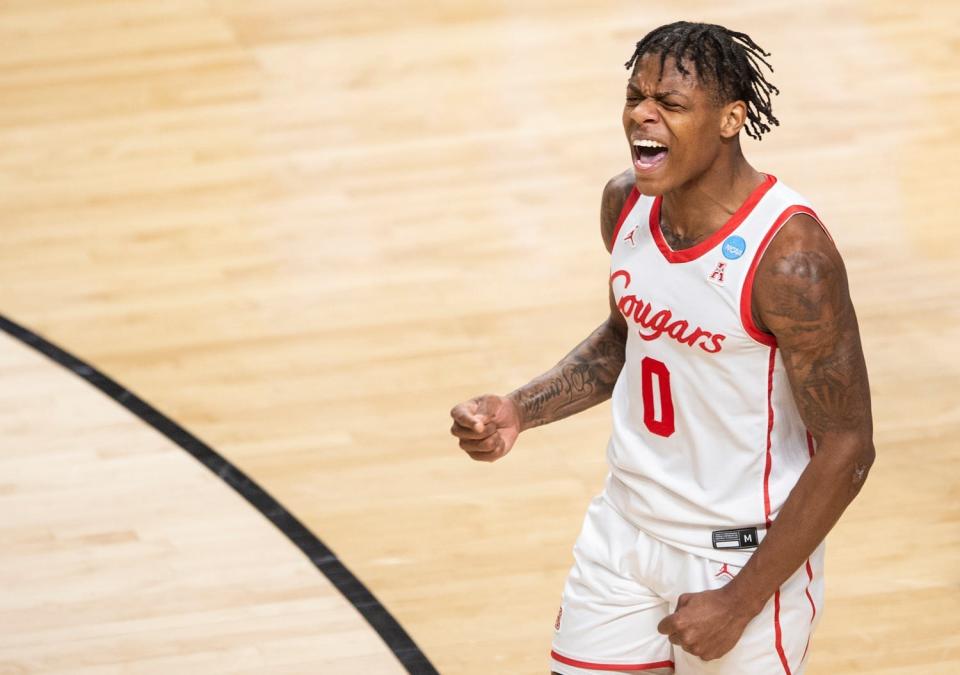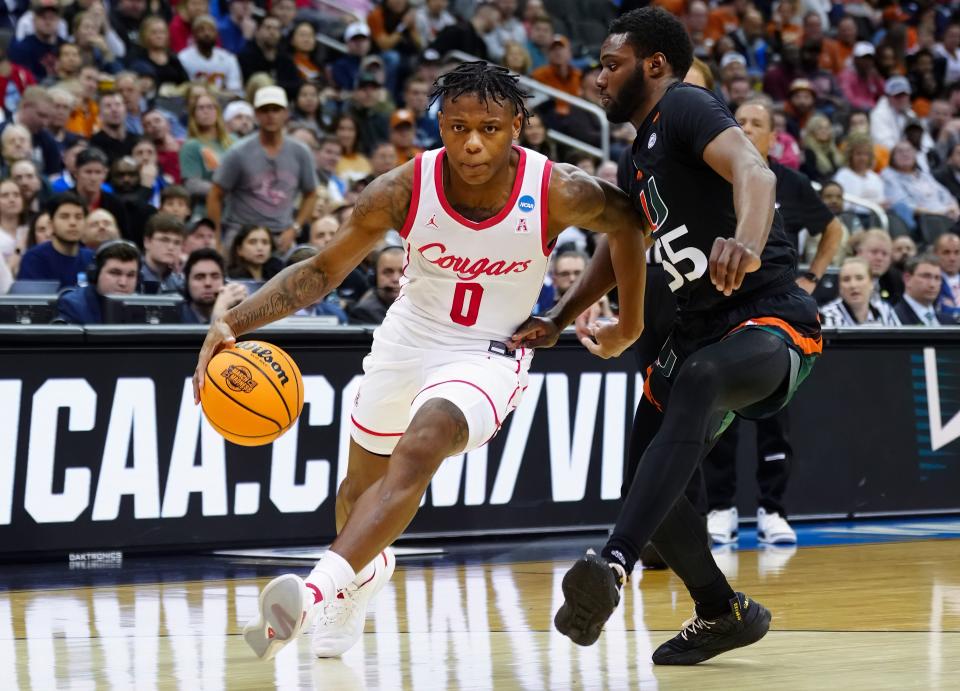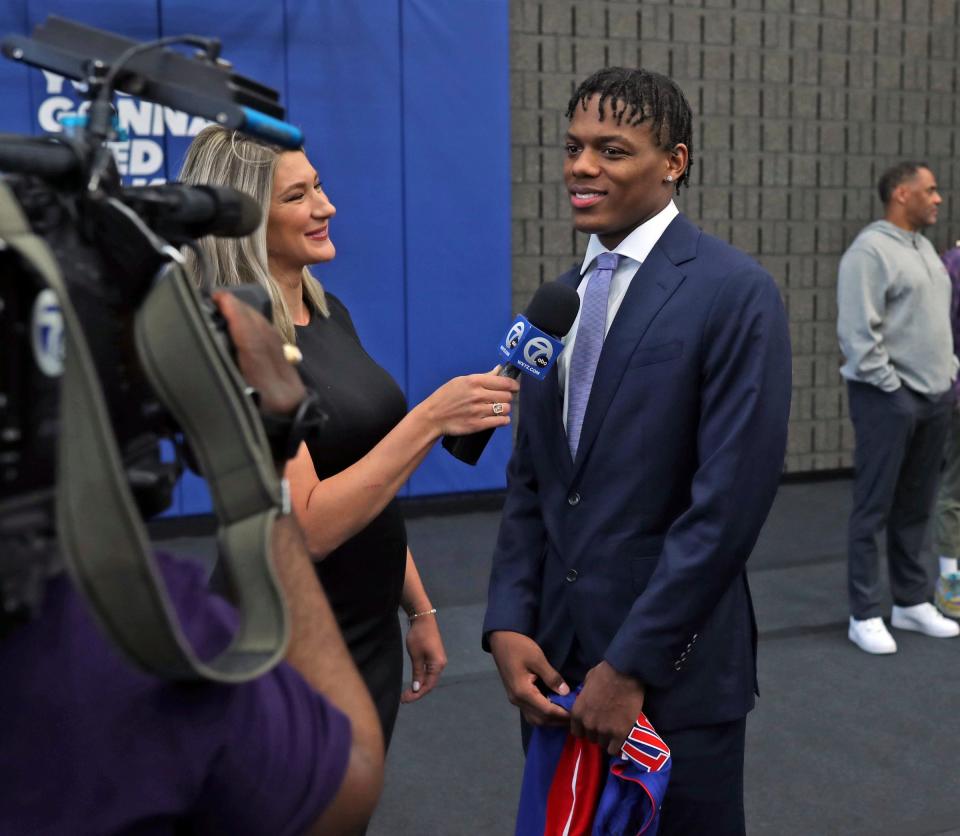It was an early December 2021 game against Alcorn State, which at 1-6 was already halfway to its season win total. Houston was 7-1 overall — coming off a Final Four run in April 2021 and early in a season that would end in the Elite Eight — and had little to prove. Yet, Marcus Sasser played like a man possessed.
The then-junior led all of Houston’s starters with 17 points and a career-high seven steals. The guard dove for loose balls, playing with the fire of an NCAA tournament game. It didn’t register to him that the opponent was a low-major school, or that Houston was cruising to an easy win after leading by 20 at halftime.
“Marcus played that game as if he was playing against Connecticut, which won the national championship,” Houston associate head coach Quannas White told the Free Press in a phone interview. “He played his heart out for 32 minutes, every single possession, and the coach praised him for that in front of the whole team in our film session the next day.
“He was the toughest, most hard-nosed, most passionate player on the floor,” head coach Kelvin Sampson added. “And here he is having an unbelievable season so far. We’re not playing Alabama or Michigan, we’re playing Alcorn State. Marcus takes every game seriously.

HIT THE COURT: 5 Pistons questions we have for NBA Las Vegas Summer League
SUMMER SCHOOL: Detroit Pistons rookies are already getting a full education, even before the NBA Summer League
Sasser, a 6-foot-1 point guard, thoroughly proved himself one of college basketball’s best shooters and defenders by the time his four-year career wrapped up in March. As a senior, he averaged 16.8 points, 3.1 assists and 1.6 steals while hitting 38.4% of his 3-pointers (on 6.9 attempts per game). Last season, he became Houston’s first consensus first-team All-American since Hakeem Olajuwon in 1984.
But beyond his on-court accomplishments, it’s his reliability that enabled him to become one of Houston’s most accomplished players. Troy Weaver called Sasser, who the Detroit Pistons traded three second-round picks to acquire with the 25th pick in last month’s NBA draft, a “rock” during his introductory press conference.
Sasser’s coaches and teammates agree. He was a tone-setter in practices, during games and in the locker room. His best ability is his dependability, Sampson said. And Houston is confident that Sasser will make a similar impact with the Pistons.
“There’s a really special quality about him,” White said. “He’s going to give it his all every single time on the floor, whenever the opportunity is given. It’s not going to matter. Let’s say he gets to the point where he’s like a Marcus Smart, a guy like that’s a star in the league. It’s never going to change with him. He’s going to be the same guy every single day, no matter where he’s at in his career.”

A gym rat
Midway through his freshman season, Sasser was promoted to Houston’s starting lineup. But he didn’t ace his first test.
That season started with summer conditioning drills, and he wasn’t in college basketball shape. Houston’s guards were required to run a mile within five minutes and 30 seconds before practice. Sasser was the only guard to miss his time during the first session.
He made his time the second time around, though. And it set the tone for the rest of his season, as far as understanding the workload required from him. He had a better fall than summer, and eventually became a starter in January, thanks to his defensive intensity.
“He never worked at the intensity and the workload that we have here,” Sampson said. “Once he surrendered — that’s a big thing in this program, you can’t fight it, you have to surrender to it — once he surrendered to it, he just made great gains.
“The reason why I started Marcus that year is that he could guard the other team’s point guard better than anyone we had — had great feet, knew how to keep the guard in front of him, had no ups and downs,” he continued. “There’s no highs and lows with Marcus, everything is the same every day.”
Sasser became Houston’s hardest worker. New York Knicks wing Quentin Grimes, a teammate at Houston who was drafted 25th overall in 2021, was renowned for his work ethic. Sasser is the only player who topped him, White said. Sasser put in extra conditioning work to make sure he could do what was asked of him, and it powered his effort on defense.
“To say that he’s a gym rat is an understatement,” White said. “He’s not only in the gym when the coaches are there, but he’s got every player at Houston — and I say this with great respect with Quentin Grimes because Quentin Grimes was a gym rat as well — he lived, lived, lived in that gym. Marcus topped him.
“Can’t say enough good things about Marcus — how good of a teammate he is. After going through practices and having familiarity with everything that’s going on, having the experience, we work really hard over here every single year. Marcus never changed. His body language was never bad, so he led by example with his effort and his intensity every day.”
Sasser was a standout at Red Oak (Texas) High School. He comes from a basketball family. One uncle, Jason Sasser, was a standout at Texas Tech and was drafted by the Sacramento Kings in 1996’s second round before enjoying a long career overseas. Another uncle, Jeryl Sasser, played for SMU before a short stint in the NBA.
Jason was Marcus’ high school coach and was high on his potential. Marcus wasn’t a hotly-recruited player, and was ranked as a three-star recruit by 247 Sports and Scout. Sampson watched him a few times in high school; he was sold on him after Sasser went off during a tournament game at Wheeler High School in Marietta, Georgia.
Beyond the defense and shotmaking, Sampson was struck by how the guard got on his teammates for their lack of effort. He gave him a scholarship offer that day, and Sasser accepted soon after.
“Everyone tells us about the top 100 kids in the nation,” Sampson said. “I don’t think Marcus was in the top 300. He was lightly regarded, not heavily recruited at all. But I got where I loved that kid, and he started as a freshman.
“Jason kept saying all these kids that played these McDonald’s All-American games, he said, ‘They’re not better than Marcus. Marcus is better than all of them.’ Jason always told me that, and at the end of the day he was right. Marcus was a first-round pick, most of them weren’t.”
By the end of his sophomore season, Sasser knew he was an NBA player. His defense and attitude got him on the floor, but it was his offensive game that helped him take off as an upperclassman and punch his ticket to Detroit.
“They drafted him because he can score”
Sasser was a sophomore when Jamal Shead arrived at Houston. Both 6-foot-1 guards, Sasser and Shead frequently matched up in practice. It was a trial by fire.
“Marcus’ hands are really, really big,” Shead told the Free Press. “And his wingspan is really big. A lot of guys stay in front of the ball, but not a lot of guys defend the ball like him. His hands are, like, freaking huge. If you would think Kawhi (Leonard’s) hands on a point guard, you would think Marcus. He’s really good at staying in front of the ball, and blocking shots or ripping the ball from you. The intensity is just always there.”
Sasser had great measurements at the NBA draft combine in May. His 6-foot-7 wingspan enables him to defend bigger than his height. His hand length — 8.75 inches — is the same as Ausar Thompson, who measures 6-5¾ with a 7-foot wingspan, and is bigger than several power forwards and centers in this year’s draft class.
He was a good shooter as an underclassman, but his offensive leap as a junior was thanks to his improved ball-handling. He went from a reliable catch-and-shoot player to an all-around 3-point ace, knocking down dribble pull-ups and stepbacks with consistency. Coupled with his floater and vision — Sampson and White both noted that he improved dramatically in pick-and-rolls as a senior — and they see him being an effective third-level scorer with the Pistons.
“He knows how to create space to get his shot off, and if you close that space now, he’ll keep his dribble alive and get to his floater,” Sampson said. “He can score at all three levels. He’s obviously an outstanding 3-point shooter, but he also has a really good float game, outstanding free throw shooter. He’s a good defensive player but he’s a better offensive player than defensive player. Detroit didn’t draft him because he’s a good defender. They drafted him because he can score.”

Draft night was emotional not only for Sasser, but for his former coaches and teammates as well. Shead witnessed his multi-year transformation firsthand, as the two played for the same AAU organization a year apart.
Sasser’s two-way ability and work ethic placed him high on Detroit’s draft board. His best may be yet to come.
“People know he can shoot, but I don’t think people understand how good of a shooter he really is,” Shead said. “He was shooting the ball at a really high clip this year, being the best player on our team, more game-plan, best defender on the team at all times. It’s harder getting your shots off when you’re being chased around and double-teamed and game-planned for. In the NBA, he’ll be the third, fourth-best player on the team, and he’ll be trying to make his mark. That’ll just be making open shots, which he can do.
“He’s a really good shooter and people don’t understand how good of a defender he is and how good of a playmaker he is. He has a lot in his repertoire that he’ll be able to show when he gets to the league.”
This article originally appeared on Detroit Free Press: Marcus Sasser’s reliability made him a dream pick for Detroit Pistons